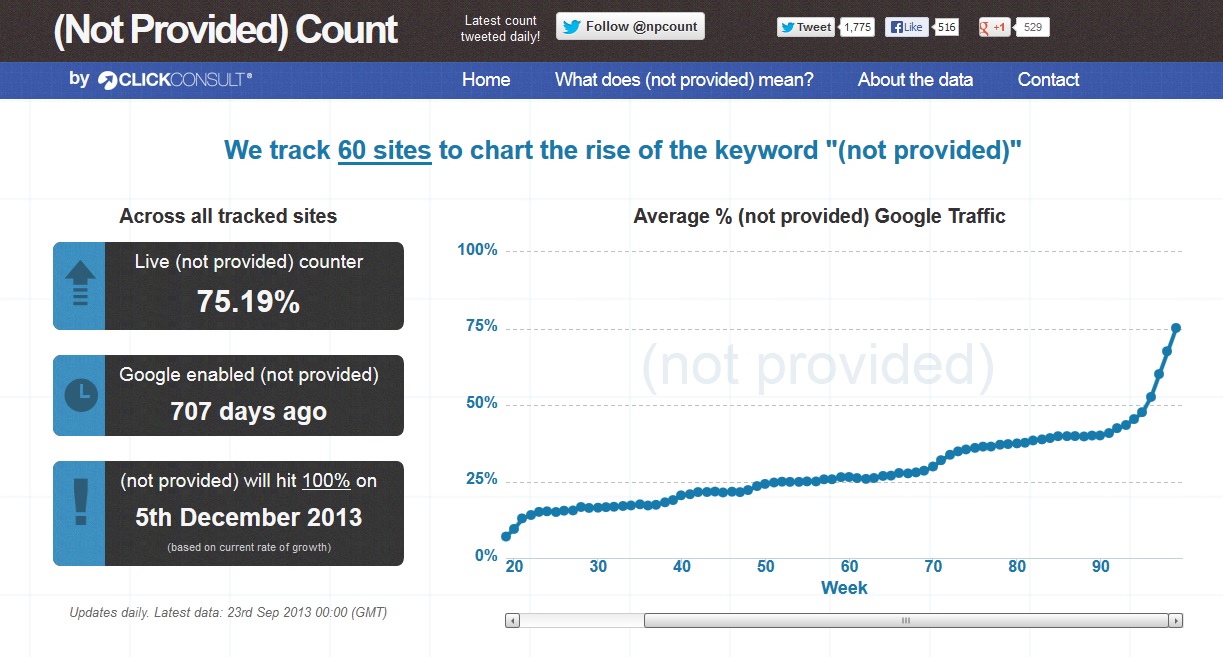Your cart is currently empty!

Not Provided
For two years now, Google Analytics has been showing “(not provided)” as the keyword when signed-in users come to our websites via search. In case this is news to you, let me explain: if someone uses Google while signed in to his or her Google account, Google Analytics will not tell you what keywords they typed in before they came to your website.
That means that you won’t know what keywords they used to reach your website.
Initially, Google said that only about 3% of visitors to most websites were sending (not provided). The (Not Provided) Count website says it is now over 75%. The screenshot below shows the visits to our website this morning: almost 90% of visitors are showing as (not provided).
At our educational site, Fresh Plans, 42% of the before-school visitors show as (not provided). This reflects what we’ve been seeing all along: the more tech-oriented the website, the more (not provided) you’ll see.
Rand Fishkin of Moz sees this as a serious problem — not just for SEOs, but for web users as well. Keyword data lets us see whether we’re communicating well with search engines and showing up for the searches our customers make. Fresh Plans is being shown to people looking for lesson plans — which is what we do there.
However, if you look at the first screenshot, we see that we have, along with people searching for things we can help them with, we also have someone looking for a “youtube beauty gurus rant.” Apparently that post isn’t communicating as well as it should.
Without keyword data, we can’t be sure that our website is conveying our message as well as it should. And now Google is not merely allowing the (not provided) percentage to rise as it has been since the change in 2011. They’re extending encrypted search to all Google users — so we might all see 100% (not provided) in Google Analytics. Fishkin points out that this loss of information will make it harder for web pros to do our jobs, and thereby interfere with our ongoing efforts to improve the websites we build and manage.
“The agreement that marketers have always had—that website creators have always had—with search engines, since their inception,” says Fishkin, “was, ‘Sure, we’ll let you crawl our sites, you provide us with the keyword data so that we can improve the Internet together.’”
Josepha has a different take. “Really,” she says, “what it will end up doing is setting back SEOs and putting the power back in the hands of people with honestly good websites.”
That would be consonant with Google’s stated intentions for the internet. As an SEO who believes in getting great results by creating and supporting honestly good websites, I’m trying not to be offended by Josepha’s remarks — but I get what she means. Several times this year we’ve seen clients seduced by companies that promise to manipulate their results without all the hard slog of focusing on quality. We’ve also seen Google remove their stuff, knock down their rankings, and otherwise hit back. If Google’s mountainous data suggests that the keyword information is mostly being used to manipulate results, then they’re within their rights to keep it private.
It may actually be about privacy, too. I’ve been able to identify searchers well enough for site owners to say, “Oh, yeah, I know who that is.” I use my powers for good, not evil, but Google has good reason to be touchy about privacy right now.
Other commentators suggest that this move, like Google’s retiring of the public Keyword Suggestion Tool, is intended to encourage website owners to turn to ads rather than organic search. Organic search is usually and should be the top source of traffic for a well-optimized website, but Google is only able to provide free tools like Google Analytics (and the best selection of free educational software anywhere) if people buy ads. They also, as a business, have a right to do what they need to do in order to encourage paying customers.
What should we do about it? Set up a filter and watch where your (not provided) visitors are going. Use the Queries and Landing Pages data in Google Analytics SEO. Use the data in Webmaster Tools. Confirm your analytics information with Clicky and Bing Webmaster Center tools.
Continue to work on your honestly good website.
by
Tags:
Comments
5 responses to “Not Provided”
I don’t mean to offend with the “honestly good websites” part.
However, we know that in the SEO community there is a large portion of time dedicated to figuring out the algo so you can break through the first page of search results.
The cumulative effect of personalized search, Panda updates, and now the spike in masked keywords serves the end user – people who search. If no one has any insight into what works and what doesn’t, it levels the website playing field; sort of an internet Jubilee. The people who are trying to find real websites that pertain to what they need are the ones who will really win with this most recent change.
Afterall, without a really good, really relevant product, Google will find itself losing more and more users to other search engines which would be far worse than making some SEOs a little angry.
Excellent point — and of course it’s undeniable that there are a lot of snake oil merchants out there. I’ll be interested to see what comes next.
Yikes! Does this mean we should stop with our keyword search campaigns when Google stops reporting?
It certainly means it’ll be harder to measure effectiveness.
Tracking keywords are very important strategy, for implementing new techniques for website promotion. Its very hard now to measure the output of the seo process. even if alternate options are available, many thinking to switch to Marketing or quit SEO.



Leave a Reply